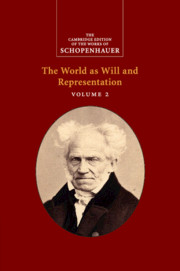Chapter 2 - On the Doctrine of Intuitive Cognition, or Cognition Based in the Understanding
Published online by Cambridge University Press: 30 June 2022
Summary
Notwithstanding its transcendental ideality, the objective world retains its empirical reality: the object is certainly not a thing in itself; but as an empirical object it is real. Space is indeed only in my head; but empirically my head is in space. Certainly, the law of causality can never be used to refute idealism by building a bridge between things in themselves and our cognition of them, thereby securing absolute reality for the world that presents itself as a result of the application of that law. But this in no way abolishes causal relations between objects and thus the relation that indisputably obtains between the body of every subject of cognition and all the other material objects. However, the law of causality only connects appearances and does not lead beyond them. With this law we are and remain in the world of objects, i.e. of appearances, and thus in fact of representations. Nonetheless, the whole of such a world of experience remains conditioned in the first place by the cognition of a subject in general as its necessary presupposition, and then by the special forms of our intuition and apprehension, and thus necessarily devolves tomere appearance and has no claim to be valid for the world of things in themselves. Even the subject itself (to the extent that it merely cognizes) belongs to mere appearance, complementing experience as its other half.
But there could never be an intuition of an objective world without the application of the law of causality because this intuition, as I have frequently argued, is essentially intellectual and not merely sensual. The senses provide only sensation, which is far from being intuition. Locke separated out the part played by sensuous sensation in intuition using the term secondary qualities, which he rightly denied to things in themselves. But Kant took Locke's method further, in addition separating out and denying to the things in themselves what belongs to the processing of the content of sensuous sensation through the brain, and the result was that this included everything Locke had left to the things in themselves as primary qualities, namely extension, shape, solidity, etc., and so with Kant the thing in itself became a fully unknown = x.
- Type
- Chapter
- Information
- Schopenhauer: The World as Will and Representation , pp. 23 - 29Publisher: Cambridge University PressPrint publication year: 2018

